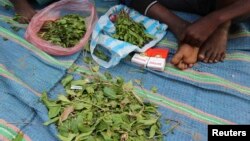“The president has arrived, the president has arrived,” chant youths in Mogadishu's Beerta Khaatka market, as armed men in trucks mounted with machine guns escort lorries with horns blaring through the throng.
The joking salutation is not for Somalia's president, but hails a national institution nonetheless: white sacks brimming with leafy sprouts of khat, the narcotic shrub chewed across the Horn of Africa and Yemen in a tradition dating back centuries.
The ubiquitous sight of young men with rifles slung over their shoulders and green stalks of khat dangling from their mouths is emblematic of the Somalia of recent decades, where marauding Islamist rebels and warlords bent on carving out personal fiefdoms have fomented a culture of guns and violence.
Grown on plantations in the highlands of Kenya and Ethiopia, tons of khat, or qat, dubbed “the flower of paradise” by its users, are flown daily into Mogadishu airport, to be distributed from there in convoys of lorries to markets across Somalia.
Britain, whose large ethnic Somali community sustained a lucrative demand for the leaves, banned khat from July as an illegal drug. This prohibition jolted the khat market, creating a supply glut in Somalia and pushing down prices, to the delight of the many connoisseurs of its amphetamine-like high.
“Those who exported to London have now made Mogadishu their khat hub,” said Dahir Kassim, an accountant for a wholesale khat trader in Somalia's rubble-strewn capital where women under umbrella stands sell khat bundles wrapped in banana leaves.
The price of the cheap Laari khat popular in the impoverished country has halved to about $10 per kilogram since Britain outlawed the stimulant. A kilogram of “Special” or “London” khat has also gone down to about $18 from $30.
Before the UK ban, 27-year-old mason's assistant Mohamed Khalif could only afford to chew once a week. “Now I chew daily and my problems are over,” said Khalif, blissfully.
The daily arrival of the khat trucks galvanizes markets, sending female traders scrambling for the sacks of stems and leaves, whose potency wanes within a few days of plucking.
Other street vendors take advantage of the hubub to try to sell soft drinks and cigarettes.
Time-old tradition or harmful vice?
“I bought my own houses from khat sales,” said 55-year-old wholesale seller Seinab Ali in Mogadishu, distributing bundles of wrapped leaves to local traders.
But khat exporters in Kenya, a former British colony where the cash crop bolsters the local economy, say the UK ban has slashed their profits from sales to Somalia.
“Britain has made our khat business useless,” said Nur Elmi, a khat trader in Kenyan capital Nairobi from where shipments to Somalia have almost doubled after Britain's ban.
“They cannot afford to buy it all [in Somalia], so we sell it at throwaway prices,” he said.
The British decision to classify khat an illegal class-C drug was surrounded by heated debate, with critics saying it would create a lucrative clandestine market and even alienate immigrant youths, driving them into crime or Islamist extremism.
Home Secretary Theresa May had argued in backing the ban that it would help prevent Britain from becoming a hub for the trade, which was already banned in the United States and several European countries. She also cited evidence that khat had been linked to “low attainment and family breakdowns”.
While defenders of khat-chewing hail it as a time-honored social tradition comparable to drinking coffee, detractors say it shares part of the blame for the violent and destructive chaos suffered by Somalia for the last 20 years.
Somalia's cash-strapped government seldom collects health statistics. The spike in use is a concern but officials are too busy battling Islamist al-Shababrebels and rebuilding Somalia's state institutions to dedicate much attention to it, said the Mogadishu mayor's spokesman Ali Mohamud.
“Somali people are wasting money, time and energy on khat,” he said. “Khat has only advantaged those who grow it.”
A 2006 World Health Organization report on khat said it can increase blood pressure, insomnia, anorexia, constipation, irritability, migraines and also impair sexual potency in men.
Even many of those who make a living from the khat trade recognize that its consumption can be harmful.
“Khat is good for mothers who sell it but for those who consume it is a disaster. Day and night I pray to God so that my children do not chew khat,” said wholesaler Ali.
Many Somali women point to wrecked marriages and abandoned children as testimony to the dangers of excessive use of khat.
“Men who chew are not good,” said Maryan Mohamed, who said she had been married 13 times. “They chew alongside their hungry children.”






